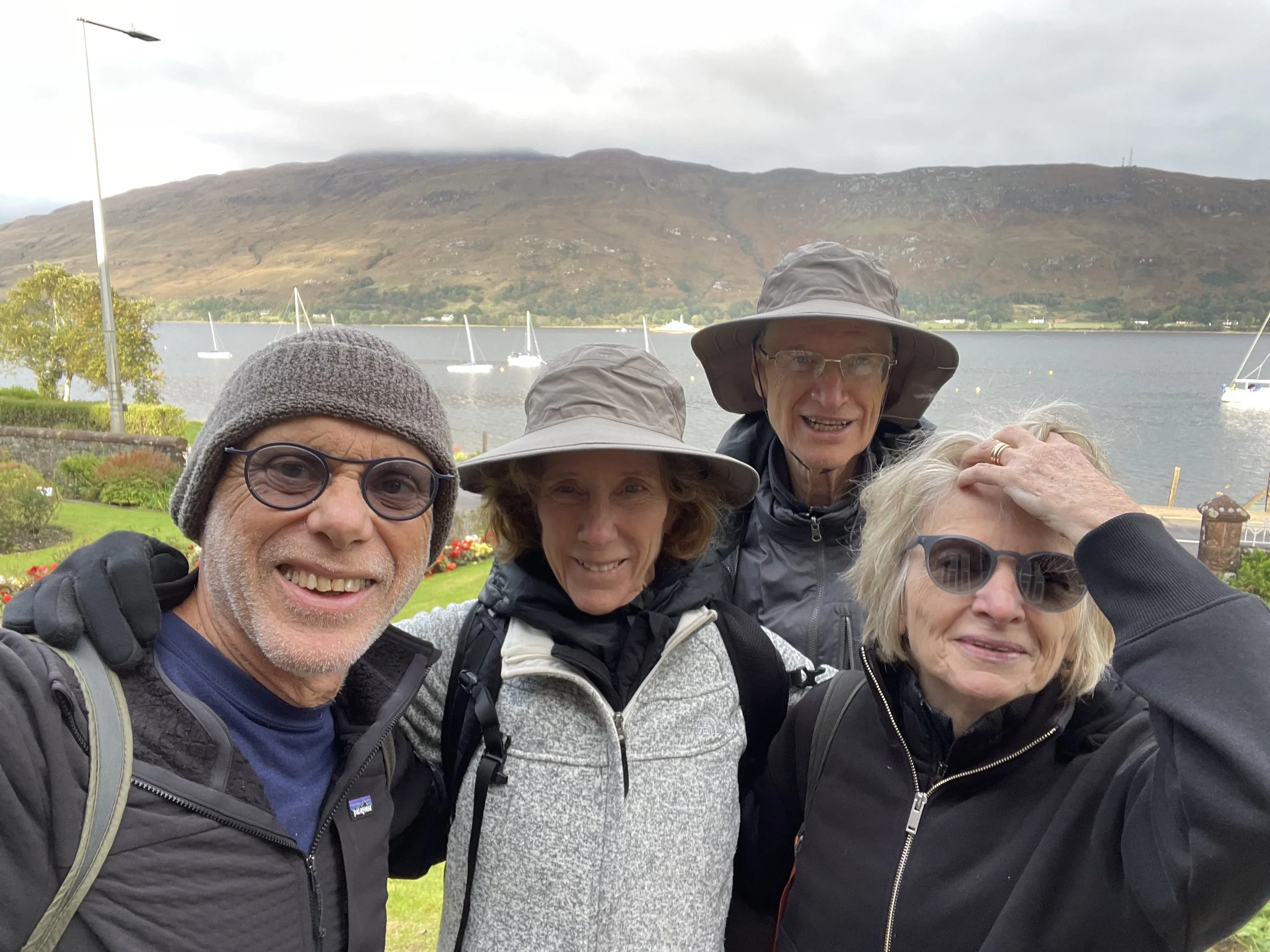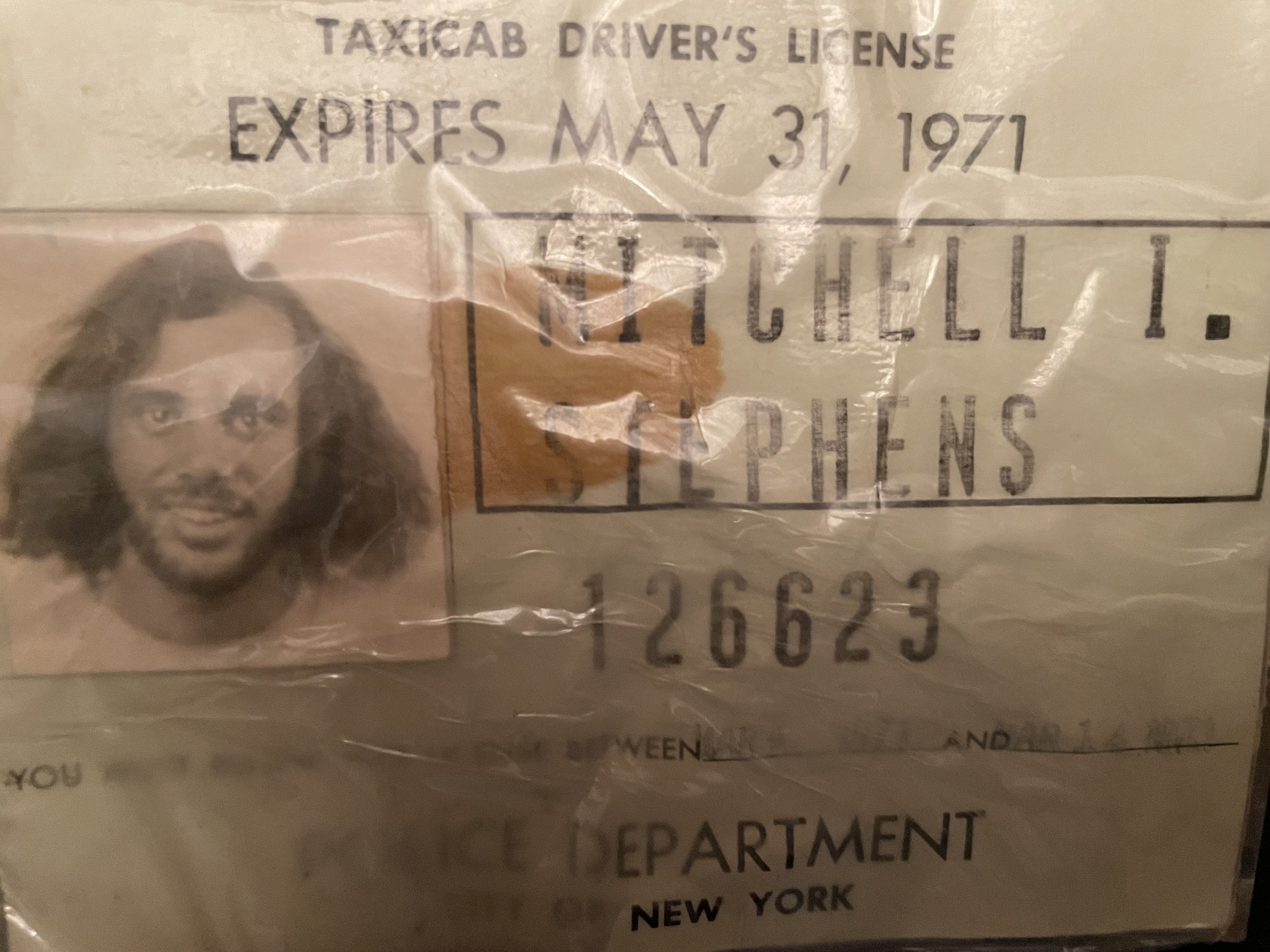No! American Journalism has not gotten worse
Rabid partisanship, dissembling, unwarranted attacks and bigotry are not, alas, new embarrassments for American journalism. It has a lot of improving to do.
A video by Mitchell Stephens
the impact of helene
There’s a sign at the eastern terminus of Interstate 40, near North Carolina’s Atlantic Coast, that reads “Barstow, Calif., 2554 miles.”
I-40, one of the longest continuous interstates in the nation, cuts right through America, through state after state, almost from coast to coast. A little more than a week before Hurricane Helene hit the mountains of western North Carolina, where it killed dozens and created unfathomable destruction, we drove through those mountains, on I-40, on the way to and from now equally troubled eastern Tennessee.
I don’t like that part of the drive very much—even though it’s an interstate highway, the road is twisty, narrow, and you feel almost claustrophobic with the southern Appalachians hanging gloomily over you. There’s not much distance on either side of the highway and there are a couple of tunnels that miraculously were built through those mountains. How did they do that?
Because of the engineering difficulties, the road through the mountains wasn’t completed until the late 1960s. Now parts of it are gone, but I-40 is only one of the almost numberless roads in the area that are broken, closed, impenetrable, impassable. ...
walking the walk
So, two men and two women in their mid-seventies decide to walk across a skinny part of Scotland—from Fort William in the southwest to Inverness in the northeast.
The Great Glen Way, the route is called.
We now live, of course, in an age when people are willing to pay good money to exhaust themselves so thoroughly. And, sure enough, there are firms ready not only to provide the two couples with indoor and quite comfortable lodgings along the way but with someone to drive their baggage from one night’s stop to the next.
Hence, all that is required of the two couples is that they schlepp themselves, along with an extra waterproof layer, a lunch and some water about seventy miles in six days. ...
fURTHER reading about Our Generation
Here’s some of what we have seen recently that might be of particular interest to our generation. (Apologies for any pay walls.) Send us what you have seen at WritingAboutOurGeneration@gmail.com.
Hard Work and Fizzy Drinks: What It Takes to Live Past 110, Sara Ruberg, New York Times, Aug. 21, 2024
Caution! These Drugs Can Cause Memory Loss, Rachel Nania and Aaron Kassraie, AARP, Aug. 7, 2024
Meet the Granfluencers, Nicole Schmidt, The Walrus, Aug. 8, 2024
Who killed the Kennedys? The Rolling Stones won’t tell you anymore., Paul Schwartman, Washington Post, July 11, 2014
Some Seniors Readily Step Back. Some Never Will., Paula Span, New York Times, July 21, 2024
To Delay Death, Lift Weights, Alex Hutchinson, Outside, Nov. 22, 2024
The VP Debate: walz rose, vance struggled
It was, in contrast to any debate Donald Trump ever attended, a civil, even staid, discussion of issues.
And it helped that the CBS moderators Norah O’Donnell and Margaret Brennan ran a very tight ship—and that there was no studio audience to pollute things with partisan noise.
In the end, Democratic vice presidential candidate Tim Walz had a much stronger deck from which to deal: his forceful defense of abortion rights, a Democratic economic policy that does not favor only the rich, immigration policies that are humane and fair, and an environmental agenda that backs both alternative fuels and energy independence, made a compelling case—to me, anyway—that Walz and Kamala Harris have earned the right to lead America for the next four years. ...
My Worst Job Ever: Work should be more than work
I was thrilled when out of the blue I was offered a job to create an investigative unit at a local TV station.
For more than 20 years I had been on the road producing true crime TV series. So, even though I was working as a freelance producer for major national cable and broadcast networks, at 57, I was looking forward to having some stability in my life.
The red carpet was rolled out when I started. The bosses sang my praises to the newsroom staff, which consisted of reporters and producers half my age. Whether it was jealousy, the fact I got my own office or I was old enough to be their mother, I was persona non grata from that day forward. It never changed in the seven years I worked there. ...
En vacances, and just chilling
Last day in Cassis. At this time tomorrow we'll be dressing for the opera in Paris. We'd much rather be here.
We were busy with trains, taxis, hotels, apartments, museums and tours during the first part of this trip. So much packing and unpacking. We gave ourselves a full week in Cassis, which we'd visited in 2018, and it is beyond well worth it.
No side trips to Marseille or Aix, which we'd once considered. No formal activities at all. We briefly pondered taking a boat tour of the Calanques (stunning local fjords), but that would have involved standing in line for tickets, waiting for the boat and other unacceptable impingements on our right and desire to chill.
We are en vacances. It is beautiful here when you step out the door. Relax. . . .
Changes in attitudes, changes in traveling
How do you travel?
I’m asking because my friend and colleague Mitch Stephens, the co-editor of this site, is currently traveling in Scotland, and then he and his wife will be going somewhere, although they haven’t quite made up their minds exactly where yet and definitely haven’t made any reservations.
Not for planes, nor trains, nor automobiles. Not for hotels, too.
They might be going, they think, to southwestern France. Or maybe to Spain. Or maybe they’ll explore more of the UK. Or maybe not. They’ll figure it out. They’ll make those reservations, just no need to do them until they have to.
They hadn’t made their train reservation to Edinburgh and their hotel reservation in Edinburgh until something like a few minutes before got on a plane to London.
It’s a great way to travel. It’s not, any longer, my way.
And I’m guessing, it’s not the way many of us now travel these days. ...
Night swimming, ambling toward the light
By day, I am an arts warrior, public servant, heroic crip. Open, responsive, cocksure, ambitious—I seize the public gaze as a bully pulpit. Offstage finds me enslaved by quivering muscles contorting my stride.
After surgery, my swollen spine shut down. Gurus and saints abounded, but no roses from above. Paralyzed weeks turned into months—a flicker, a twitch, a wave, sitting to standing, six steps to go home, with wheelchair, ankle brace and cane.
Gestures repeat to imprint; but gravity intervenes. Syncopated embellishments focus spatial awareness, though alignment remains akimbo. With little sensation, each footstep is defiant. Only in the pool can I run with the ponies again.
Twenty-eight years now—I still fixate on atrophy, ignoring progress. Balancing rehab and recovery, clinging to a reconnecting, physical therapy and pharmaceuticals combat lost kinesis, encouraging hope.
Night murmurs locate points of pleasure: behind the left knee, above the nipple. I crawl inside the softness, relishing the incandescent kundalini rush absent pain. Legs lie quiet, the burning subsides. Stillness embraces me.
In the extra room (that we do not have), I plié and pirouette with dramatic abandon, leaving behind my imploded, twisted carcass. The tumor does not return. My pelvis aligns. Depression dissipates. Then I awake. ...
Roiling in the turbulence of tracking polls
My mood these days rises and falls as frequently as a sailboat flung between swells in gale-driven seas. The sharp twists and turns often leave me exhausted and metaphorically seasick by bedtime.
The true cause is neither wind nor water, but tracking polls and other analysis for the 2024 presidential election. I follow them obsessively as they fluctuate as wildly these days as the waves and wind in the eye of a major storm.
Take Sept. 24. I probably checked my go-to political headline site, politicalwire.com, about 15 times, starting at about 7a.m. soon after I rolled out of bed. The news good, then pretty good, then worse, then good again, then pretty devastating.
At 7:47 came the news, from CNN, that “more than 400 economists and former high-ranking U.S. policymakers are endorsing Vice President Kamala Harris and her vision for the American economy.”
Chalk up one for the good guys. ...
Starting over, again and again
There was so much I wanted to do and accomplish at 22. Experience motherhood, join the Peace Corps, become a psychologist.
Instead, I became a clinical social worker; earned a master’s in social work; left my home and my religion; and moved away from New York. I was on a journey to become myself.
I wanted to organize workers into unions, act on the stage, and start a revolution. But where would I begin now that I was 32?
When social work lost its allure, I switched to a college teaching position. (I could start my revolution by enlightening students.) I married and had three wonderful children without morning sickness and labor pains (they were the product of my husband’s first marriage) and earned a Ph.D., too.
And suddenly I was 40.
When I turned 50, a line from “Fried Green Tomatoes” seemed to fit me well: “I’m too old to be young, and too young to be old.” Up until then, I had had too many moments of longing, waiting for the future. Too many days had gone by without savoring my existence. ...
My worst job ever: and most taxing, too
Here’s something you definitely do not want in a job:
An understanding that the faster you drive the more money you make.
But at the beginning of my junior year in college—a semester I spent away from Haverford College and in New York City, going to NYU—I got a job in which such a calculation clearly applied.
I became a “hack,” a cab driver.
It wasn’t a hard job to get: You got your driver’s license upgraded to a “Chauffeur’s License,” applied to the New York Taxi and Limousine Commission, took a test on the addresses of various places taxi customers might have been inclined to go (such as Yankee Stadium: then 161st Street and River Avenue) and sat in on a safety class (in which I learned to stay away—on two-way avenues with a median strip, such as Park Avenue or upper Broadway—from the left lane, which the instructor labeled, the “suicide lane”).
And there I was: an English major sidling up to the dispatcher in a room on West 126th Street very much like the one that would later be portrayed in the TV show, “Taxi.” ...
the age of anxiety
I’ve lived with anxiety all my life even though I’ve never been officially diagnosed with it. Anxiety just wasn’t a thing when I was a child, even though I was quite aware of it. I kept it to myself. I have taken medication a few times, but as an adult, I’ve dealt with it organically. I started running in my twenties and discovered endorphins are a great antidote to feeling anxious. I still exercise regularly.
A little later in life, I adopted yoga and meditation, which have been incredibly helpful over the years. I’ve also learned to do deep breathing when I panic.
But despite those strategies, I still deal with those uncomfortable feelings, especially when I’m in a situation where I don’t have control. Yes, that describes most of life, doesn’t it?
Many situations trigger my anxiety. We are currently in negotiations over the sale of our house. And we will soon be moving into a new smaller house.
But until that happens, my anxiety is a constant unwelcome companion, the familiar dread sabotaging my stomach and stealing my sleep. I’ve often envisioned my anxiety as some sort of being, so I was gratified to see it portrayed as a character in the recent movie “Inside Out 2.” …
here’s to you, mr. Robinson
I live in North Carolina. Mark Robinson is my lieutenant governor.
Let me rephrase that first sentence: I live in the Chapel Hill part of North Carolina, which is really not that much different from living on the Upper West Side of Manhattan. But Mark Robinson is still my lieutenant governor.
And Mark Robinson, Republican candidate, has a chance to become my governor.
It is, obviously, more than just an embarrassment.
It is also, alas, not an aberration. For years, when we moved here, North Carolina had been a beacon of the almost-progressive “New South,” under governors like Luther Hodges, Terry Sanford and Jim Hunt. Despite being represented on the national stage by Jesse Helms, it had created the first collaborative research park. It had created the original Smart Start program for pre-kindergartners.
Despite Helms, it had started to creep out of the shadow of segregation and Jim Crow and poverty. Instead of tobacco, it had become known for cutting-edge research and technology....
An Obit for my boots: 1965-2024
My Frye boots, big, bulky and battered, the oldest living household survivor of my 1960s fashion sense, passed away peacefully Sept. 9 after a long period of increasing obsolescence and occasional embarrassment when I tried to put them on.
They were pre-deceased by my Nehru jacket, several pairs of bell-bottoms and a number of tie-dyed shirts.
The Frye boots, which were born to go with my “Georgy Girl” cap and my flower-power plaid denim pants, started life as an accoutrement before becoming symbolic of a consistent misunderstanding of fashion that had long ceased been fashionable.
Attempting a Triathlon—at 75
I was a terrible athlete as a kid. One year I got a total of one hit in the entire Little League season. But I have since learned that even if I ain’t particularly coordinated, I can be excessively dogged.
So as an adult I ran some and biked some. But I didn’t dare a triathlon until I was turning 70.
We had bought a house near a lake, and I had finally learned to do a half-way decent crawl. And, one day, it occurred to me that I could now do all “tri.”
It proved unsurprisingly hard—a half-mile swim in a bay, a 13-mile bike ride, then a 3-mile run. (This was a “Sprint Triathlon”; all those distances are doubled in “Olympic Triathlons.”) There were hills (though not on the swim)....
Living the Good Life
Back in 1974 Rick and I bought a hay field in the hills of Vermont. Our son had just turned two.
We decided to follow Scott and Helen Nearing’s lead after reading their book “Living the Good Life” and build a stone house. The permit was secured in July, which only gave us a few months to put a roof over our heads before cold weather settled in. We lived in a tent and several college friends arrived to help.
I found a bevy of field stone on a farmer’s property, and he agreed we could take as much as we needed. So, every day I put my son in a Snugli on my back and drove to Farmer Norris’ field and hauled stone back to the building site. I managed to make 36 trips....
Learning from artists at work
Last month I was artist-in-residence at The Fabric Workshop and Museum in Philadelphia developing ideas for an interdisciplinary installation for an exhibition this fall. I am primarily a filmmaker and got to experiment with a very talented studio production team. A rare and precious opportunity indeed.
Accompanying me was a perfect book, Adam Moss’ “The Work of Art: How something comes from nothing.”The writer, former editor of New York magazine and The New York Times Magazine, interviews 43 creatives on how they make their work, using iconic examples to illuminate their process.
His aim: “to render the experience of creativity—that is, the frustration, elation, regret, first glimmers, second thoughts, distress and triumph that leads to works of art” . . .
When democracy is at stake: the weakness of an ‘impartial’ press
I view Donald Trump as sui generis—one of a kind. We simply have not seen in this country one politician who, by himself, is so off-the-charts narcissistic, ignorant, lazy, venal, dishonest and cruel.
Add to that his designs on destroying our democracy—he tried and failed once on Jan. 6, 2021, and hopes to do it again, bigly—in 2025, and Houston, we have a problem.
That, in turn, raises a question for me, a former White House correspondent and national political correspondent, who tried over 20 years with the New York Daily News—through Democratic and Republican administrations—to be as objective as possible in his political reporting from Washington:
“How can one be objective in reporting on Donald Trump?” . . .
(photo: Jose Luis Magana/AP)
Anxiety
Happened to mention to the doorman this morning that I have something difficult to do tomorrow, and that I’m anxious.
Quite anxious, to be sure, though I didn’t go that far with the doorman.
Am I more anxious because I’m old?
It feels that way. Do less and what you do do feels more difficult. And you move and think somewhat slower so maybe things are in fact more difficult for older you—for older me.. . .



















